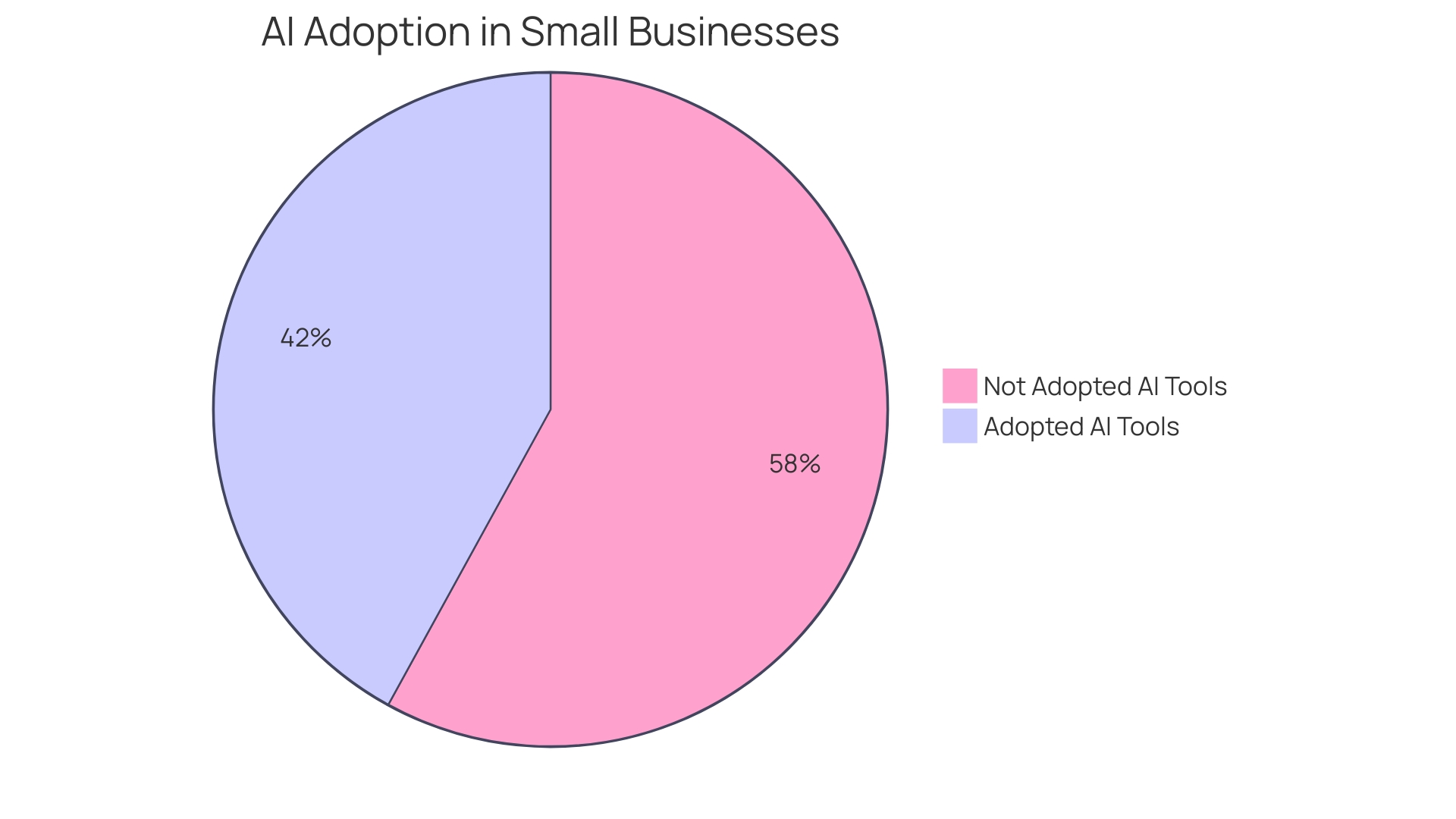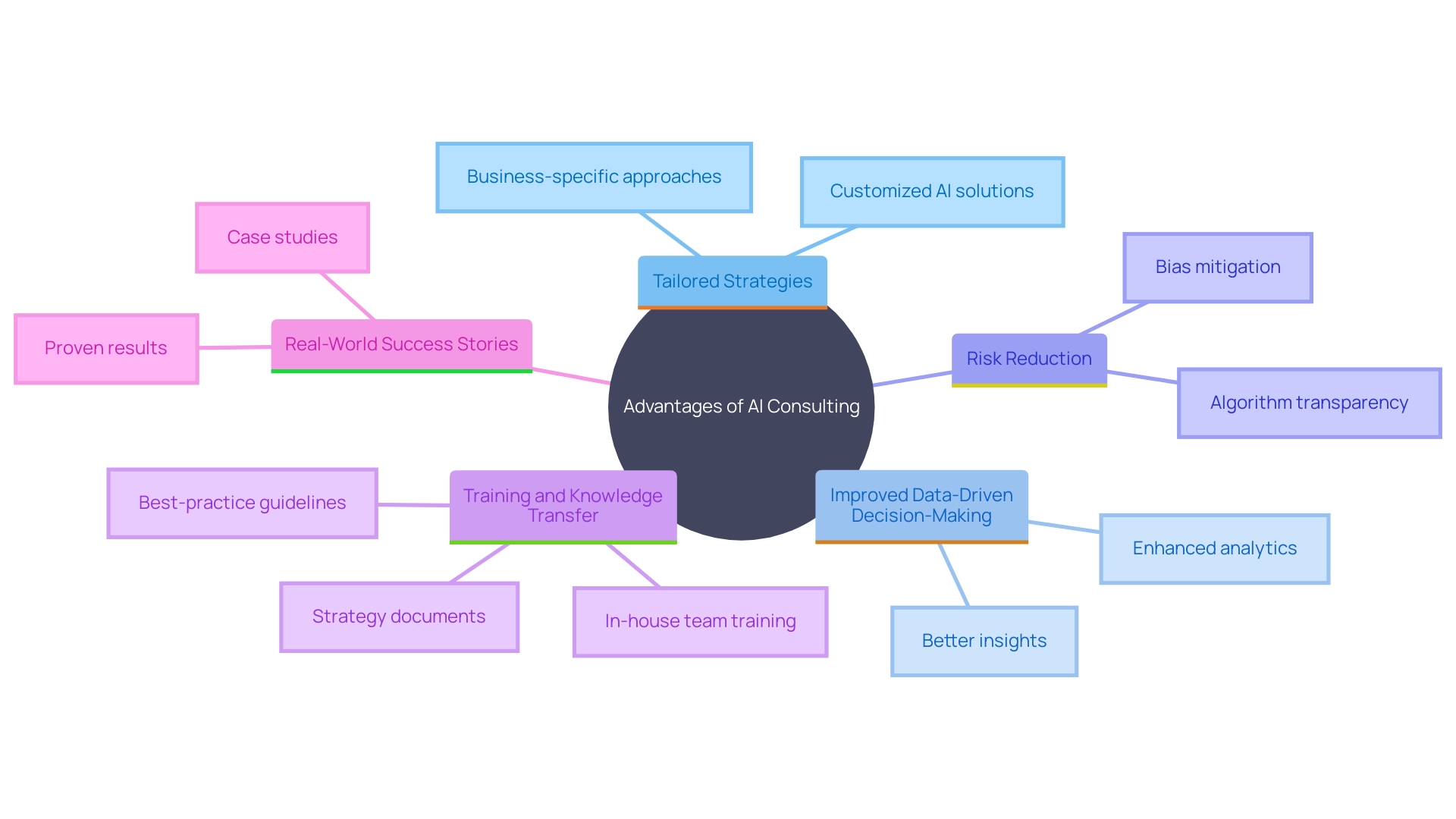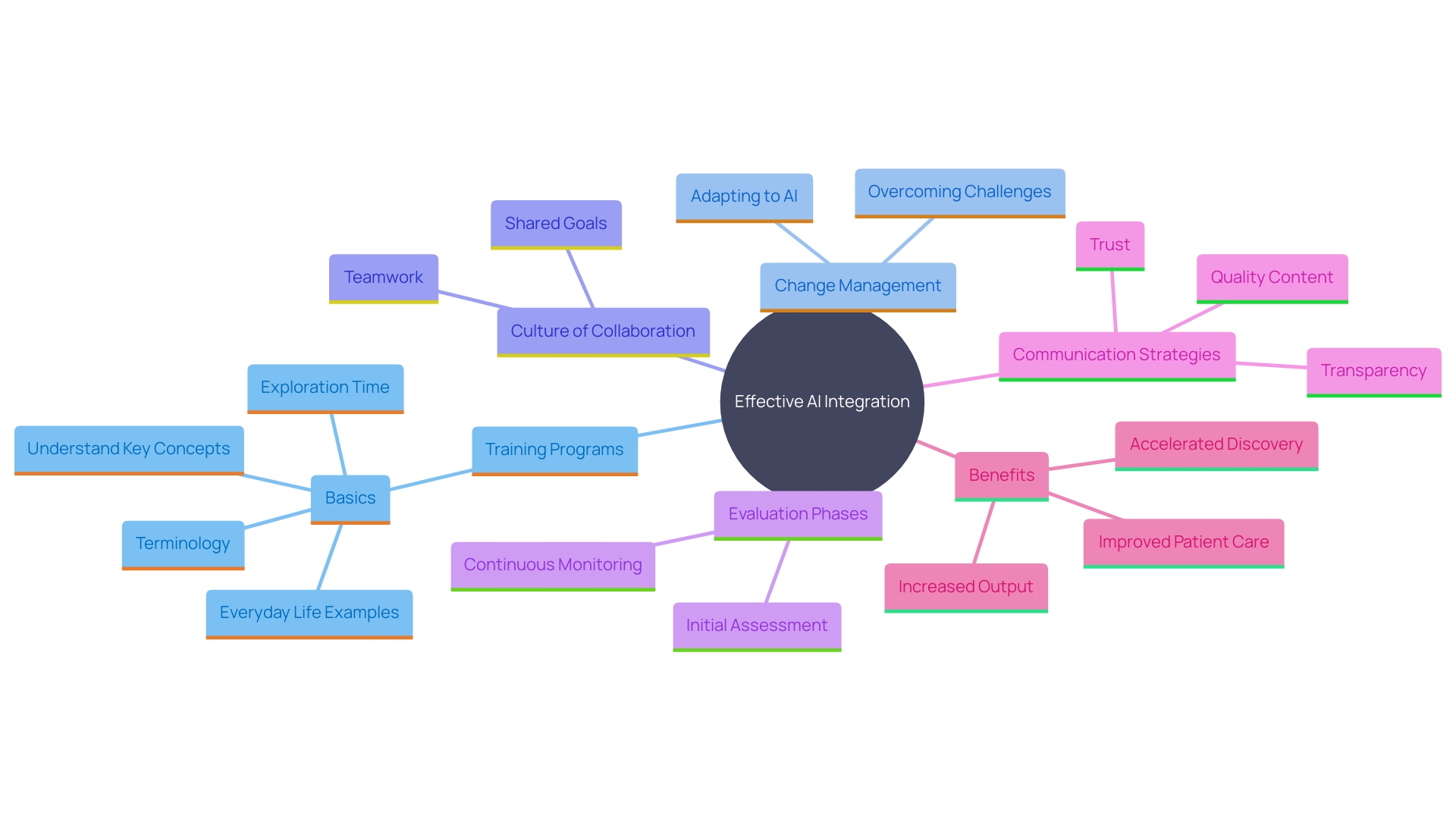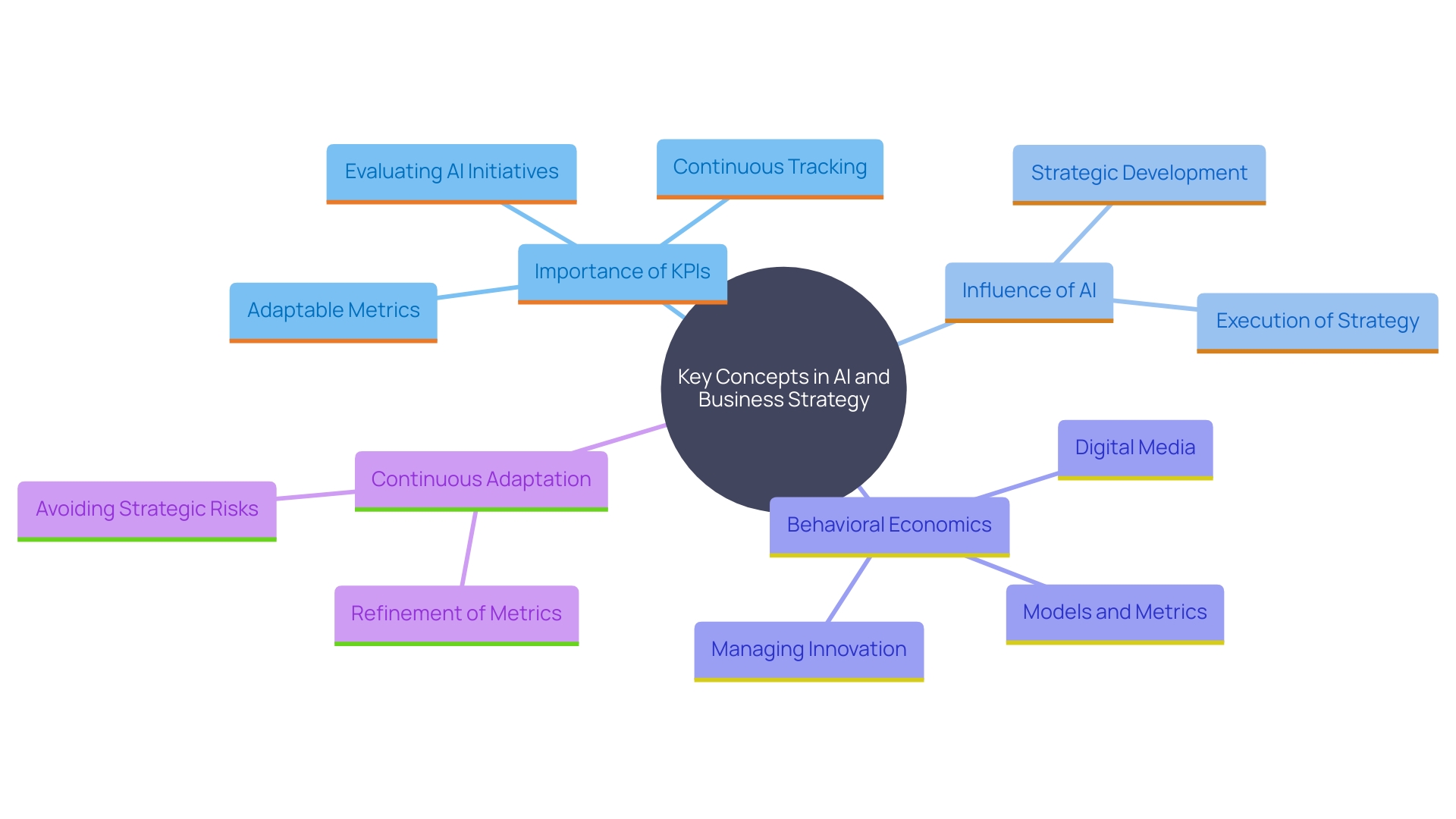Introduction
In today’s fast-paced business environment, staying ahead of the competition requires more than just traditional methods. The integration of artificial intelligence (AI) has become a cornerstone for driving business success, offering transformative benefits that span across decision-making, operational efficiency, and customer experience enhancement. This article delves into the pivotal role of AI in modern business, exploring how AI strategy consulting can provide tailored solutions that align with organizational goals.
It also highlights the importance of effective implementation and training, underscoring how these elements contribute to a seamless AI adoption process. Furthermore, the article examines the critical metrics for measuring AI’s impact on business performance, ensuring that companies can continuously optimize their strategies and harness the full potential of AI-driven innovations.
The Importance of AI in Business Success
In an increasingly competitive landscape, businesses must leverage the power of artificial intelligence (AI) to stay relevant and drive growth. AI enables organizations to enhance decision-making, streamline operations, and improve customer experiences. For example, automating identity verification and simple order inquiries can significantly reduce manual, repetitive tasks, providing quick wins in terms of efficiency and cost reduction. According to a recent report, 42% of companies with 10 or fewer employees are now using AI tools, underscoring its accessibility and impact.
Furthermore, the acquisition of MarketMuse by Siteimprove emphasizes Ai’s role in enhancing content development and planning, showcasing its worth beyond conventional uses. Organizations can access new sources of income, lower expenses, and innovate more rapidly by incorporating AI into fundamental operational plans. Experts like Dr. Rachel J.C. Fu emphasize that Ai’s transformative power can supercharge productivity, offering a competitive edge in today’s market.

Key Benefits of AI Strategy Consulting
AI consulting provides a multitude of advantages for organizations aiming to implement AI solutions effectively. These benefits encompass tailored strategies that align seamlessly with organizational objectives, thereby ensuring that AI initiatives are not only innovative but also relevant to the company’s goals. By leveraging automation, AI consultants can significantly enhance operational efficiency, which is crucial for businesses striving to stay competitive.
A critical aspect of AI consulting is the improvement of data-driven decision-making processes. This is achieved through advanced data analytics and machine learning models that provide deep insights and predictive capabilities. AI consultants provide extensive expertise in best practices, which assists entities in reducing risks linked to AI adoption. This is particularly important given the rapid evolution of AI technologies and the continuous emergence of new enterprise solutions, models, and use cases.
Moreover, AI consultants play a pivotal role in navigating the complexities of AI adoption. They provide training and knowledge transfer to internal teams, ensuring that the entity is equipped not just with a strategy but also with the understanding and tools needed for effective implementation. This holistic approach is essential for fostering an AI-ready culture within the entity.
The impact of AI consulting is further validated by real-world success stories. For example, Creative Dock, the largest independent corporate venture builder in Europe and MENA, reported a 70% year-to-year revenue increase following strategic AI-driven acquisitions. Such examples highlight the potential of AI to drive significant growth and transformation in enterprises.
In summary, AI strategy consulting is a multifaceted service that not only provides customized strategies and operational enhancements but ensures that organizations are well-prepared to harness the full potential of AI. By integrating AI consulting services, businesses can streamline operations, enhance decision-making, and create new avenues for growth and innovation.

Implementing AI Solutions: Integration and Training
Successful AI implementation hinges on seamless integration with existing systems and processes. Organizations must prioritize developing comprehensive training programs to empower employees with the skills needed to effectively utilize AI tools. This involves tackling change management obstacles and promoting a culture of collaboration, ensuring teams not only adopt new technologies but recognize their value.
The journey to AI integration often begins with a critical evaluation phase. For instance, many companies initially restrict the use of AI technologies like Large Language Models (LLMs) until legal and security implications are thoroughly assessed. During this period, engineers frequently experiment with AI in personal projects, building a strong interest that can be leveraged once organizational adoption begins.
A robust training program plays a pivotal role in bridging the knowledge gap. Despite the rapid adoption of AI, there remains a significant divide between those proficient in its use and those who are not. Higher-income workers and executives are more likely to adopt AI, while employees across all levels express a desire for organizational training programs. Providing training can democratize AI use, ensuring that all employees can contribute to and benefit from AI-driven initiatives.
Moreover, creating a culture that embraces AI requires transparent communication about its benefits and potential. According to Ipsos research, the most successful AI initiatives prioritize strategic planning and clear communication. By concentrating on these areas, entities can tackle opposition to change, motivating employees to view AI as a resource that improves rather than endangers their positions.
In summary, the roadmap to successful AI implementation involves not only the technical integration of AI systems but also the cultivation of a supportive organizational culture. Through comprehensive training and strategic planning, entities can overcome the challenges of AI adoption and unlock its full potential for enhanced productivity and innovation.

Measuring the Impact of AI on Business Performance
To genuinely utilize the benefits of AI investments, entities need to establish key performance indicators (KPIs) that accurately evaluate the effect of AI initiatives on operational results. The Artificial Intelligence and Business Strategy initiative reveals how AI influences strategic development and execution within organizations. By continuously tracking these metrics, organizations can accurately identify areas for enhancement, confirm the success of their AI approaches, and make knowledgeable choices to improve performance. This approach mitigates the risk of relying on outdated metrics, which can lead to misguided performance measures, as seen in the 2008 financial crisis. Additionally, the continuous surge in AI research, doubling every 23 months, underscores the necessity for adaptable KPIs that evolve alongside technological advancements. According to David Kiron, the editorial director of MIT Sloan Management Review, and Michael Schrage, a research fellow at MIT Sloan School of Management, understanding and leveraging behavioral economics and metrics as strategic resources are crucial for managing innovation opportunities and risks. This perspective is also supported by Francois Candelon of the Boston Consulting Group, who emphasizes the transformative impact of technology on business strategy.

Conclusion
The integration of artificial intelligence (AI) is vital for businesses seeking growth and operational efficiency. By enhancing decision-making, streamlining operations, and improving customer experiences, AI has become a transformative force across various sectors.
AI strategy consulting is crucial for effective implementation. Tailored strategies ensure that AI initiatives align with business objectives, while insights from data analytics empower informed decision-making. Consultants also facilitate training and knowledge transfer, fostering a culture that embraces AI technologies.
Successful AI implementation involves both technical integration and a supportive organizational culture. Comprehensive training programs address knowledge gaps and change management challenges, enabling employees to view AI as an asset rather than a threat.
Measuring AI’s impact through defined key performance indicators (KPIs) is essential for optimizing performance. Continuous monitoring allows organizations to validate their AI strategies and adapt to evolving technology. Ultimately, embracing AI is about transforming mindsets and unlocking its full potential for business success.

